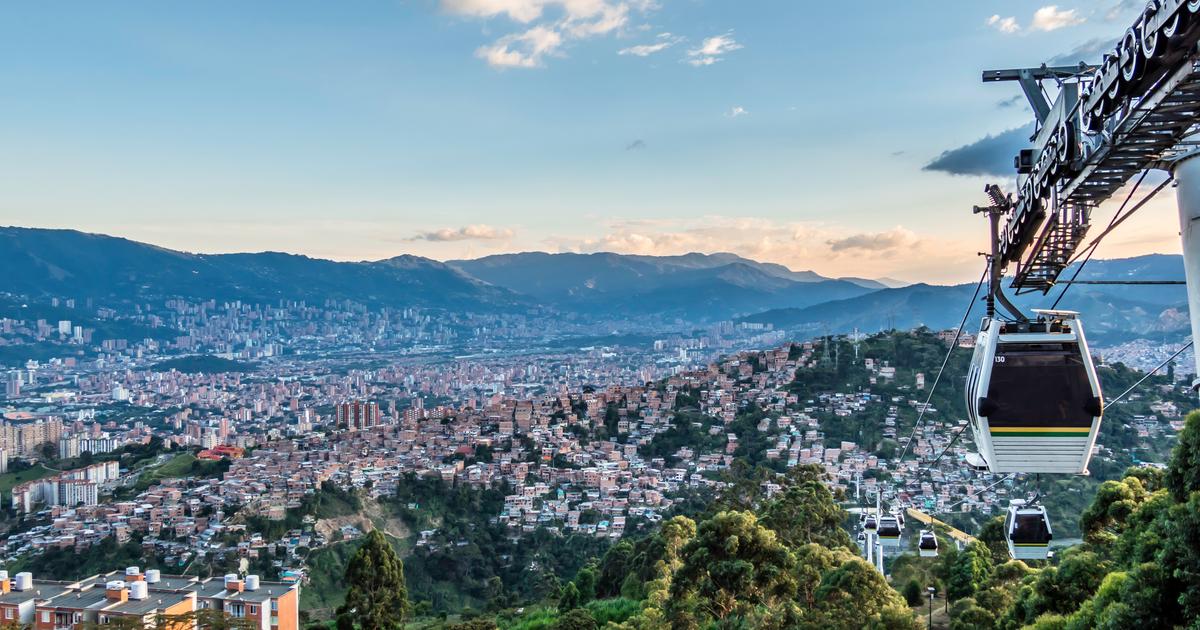Denis Orlov, 33, shares a table with his girlfriend in a cafe in the central Colonia Roma Norte, in Mexico City.
They both work quietly on their laptops while sipping their drinks.
They arrived three days ago with a specific objective: to decide whether to move for an extended period of time.
“It is our first time in Mexico and we are studying the possibility of staying for three or four months, we are in the exploratory stage,” says Orlov, originally from Russia, who currently lives in Berlin, Germany.
So many of his acquaintances have moved in the last three years, he says, and they all recommend him.
“We are looking for a sense of community, a relaxed vibe, an open-minded culture and a low cost of living,” adds the tourist, in English.
Orlov doesn't know it, but his arrival and that of thousands of other visitors to his profile has sparked discomfort among some neighbors.
This has to do, in part, with the fact that his purchasing power, well above the national average, is worsening the already very high general inflation.
In addition, the face of the neighborhoods where they are concentrated is changing and the economic benefit, however attractive it may be at face value, has not brought great benefits to the lowest paid workers.
Digital marketing specialist, Orlov has a fixed salary of 3,500 euros a month, and adds about 2,000 more, on average, through extra jobs he does independently.
With his total income of 5,500 euros, equivalent to about 109,300 Mexican pesos −almost 10 times more than the average Mexican salary−, he is enough to rent a large apartment in any of the wealthiest neighborhoods in the city, those that, unlike the majority in the urban sprawl, are relatively safe, clean and offer all the basic services 24 hours a day.
Young people, some of them foreigners, work from their laptops in a cafe in Mexico City.
Quetzalli Nicte Ha
There is a clear economic benefit for Orlov and other digital nomads, people with remote jobs and who can live anywhere in the world.
Salaries and distribution costs in Mexico are low, resulting in a cheap cost of living.
Whoever earns in dollars or euros can stretch their salary more.
Certain sectors of the capital's economy, as well as the government (because of its tax collection), also see a benefit.
Although the tax derivative is not direct via salaries because digital nomads do not pay taxes in Mexico.
Last year, the economic benefit of foreigners like Orlov in restaurants and transportation and tourism services was 9.3 billion pesos, according to Airbnb estimates.
The company recently signed a controversial agreement with the Government of Claudia Sheinbaum to attract this new type of visitor.
The spill is equivalent to 15% of the total income from tourism, so the Administration seeks to generate incentives to capture these resources year after year.
“The arrival of digital nomads, together with high inflation, has translated into an increase in housing costs for the traditional inhabitants of Mexico City,” says Héctor Magaña, an economist and professor at the Mexico City Business School. Monterrey Tech.
Only in the Hipódromo Condesa neighborhood, one of the most popular, the cost of rent has risen to reach an average range of between 18,000 and 60,000 pesos per month.
A young woman holds a sign with the phrase "Gentrification = Colonization" during a protest in Mexico City against gentrification, on November 17, 2022. Quetzalli Nicte Ha
Data from the National Institute of Statistics and Geography (Inegi) show that half of Mexican workers earn less than 4,300 pesos a month, while the average salary for an inhabitant of Mexico City is between 6,000 and 10,000 pesos a month, he says. Magana.
"If we go a little further, we find that only 2% of the population that works in our country receives more than 21,300 pesos a month," says the specialist, "this has meant that not everyone can afford to pay rent and they had to migrate to another place within Mexico City or, in the worst case, outside the city.”
Many have had to move far from their place of work, adding daily commutes of two hours, while others have moved to neighborhoods with more pollution and worse services.
If certain measures that could limit the arrival of digital nomads are not implemented, these increases in housing costs could get out of control, says Magaña.
“The State must seek to regulate that the rent prices are in accordance with the salaries received by the inhabitants of the city, so that there is a balance.
And, also, to be very clear about the spaces that are going to be available, to avoid an oversupply that leaves those people who do not have the necessary resources to be able to occupy that home without space.”
The housing issue is just one of the sensitive points in this controversy.
Within the union of restaurateurs and owners of bars and clubs there is a deep division on how to deal with these rapid changes in their clientele.
Recently, the owner of a sandwich shop in Condesa announced on social networks that she would not be serving her buyers in English, as many began to "demand," she assured.
The publication quickly went viral, sparking a debate on the rights and obligations of this new international community in the country.
(The reaction in networks was such that the user deleted the publication).
A young foreigner uses his phone in a park in Mexico City.Quetzalli Nicte Ha
Joosef Ayoub, who runs several restaurants and clubs in Colonia Roma Norte, including La Zaranda, Café Paraíso and Leonor, has approached this new face of the neighborhood with the opposite strategy.
Now, by company policy, Ayoub is looking for employees with a minimum of 60% knowledge of English.
On average, foreign diners consume 12% more, while those who visit clubs spend 20% more than Mexicans, shares the businessman.
“For us it's been pretty good,” says Ayoub.
This has not been reflected in tips for waiters, says Isaac Martínez, a partner in restaurants in Condesa and Roma such as Ciena and Meroma, among others.
"The service part has not benefited," says the businessman, "you might think that because they are foreigners they would leave a 15% tip or more, maybe 20%, but that is not what we have seen."
A waiter in Mexico City earns, on average, between 3,800 and 7,300 a month without tips, according to the Chamber of Commerce, Services and Small Tourism of Mexico City (Canacope).
Tipping Mexican waiters makes a huge difference in their purchasing power.
Orlev himself, on his third day in Mexico, shares that he has been paying a 10% tip.
“I do it because it's expected behavior, but the expectation of a tip corrupts the economy,” Orlev says, “it allows employers to underpay their employees because they know they're going to get big tips and that's not good.”
Europeans and Americans, who make up the majority of digital nomads in the city, have different policies when it comes to tipping, Ayoub says.
Americans tend to leave around 20%, because their low-wage culture is similar to that of Mexico, while visitors from Europe are used to tipping being optional.
A young man holds a sign with the phrase "My city is not a merchandise" during a protest in Mexico City, on November 17, 2022. Quetzalli Nicte Ha
“An increase in the ticket per person makes people tip a little more, although it is not the indicator that I would like, because I genuinely want all my collaborators to do much better,” says Ayoub, referring to the servers who They work in their restaurants.
“But here is also born the philosophy that you have to develop as a collaborator to learn more.
Normally your job was to come serve and have a good time.
Now it is also studying English or another language to have that connection with the person who comes to visit you and to leave you a little more money”, says the businessman.
This could be just the beginning of a global trend driven by telecommuting, and governments like Costa Rica and Greece are creating laws and regulations to accommodate this new type of visitor who is more than a tourist, but is not a permanent resident. .
A study by consulting platform MBO Partners found that there were 15.5 million American digital nomads in 2021, an increase of 42% from 2020 and 112% from 2019. In the survey, MBO asked Americans who are not currently nomads digital if they plan to become a digital nomad in the next two to three years and 24 million said yes.
Both Magaña, Ayoub and Martínez agree on a fundamental thread: the Government's promotion of the city as a destination for this new type of visitor has to come with clear rules that protect the locals, in addition to offering the same security and services in colonies that do not usually attract tourists.
A young foreigner uses her phone in Parque México, in Mexico City, on November 11, 2022.Quetzalli Nicte Ha
“There is no awareness of the long-term effects, of the displacement, of the responsibility that must accompany these movements,” says Martínez.
"This could be a lost opportunity if there is no reinforcement of the local, of promoting roots, of valuing the people who have always been there," adds the businessman.
Ayoub, for his part, hopes to catapult the capital as one of the best known for its gastronomic and entertainment offer.
“We need to position ourselves and become a much more important city,” he enthused, “than club nights being like in Berlin and restaurants like in Paris or New York.
There is always a theme of setback among Mexicans who say "it is that we should fight more for our country."
Carnal, that's a throwback.
Fighting for your country is opening yourself up to everything new that is coming and raising the name of Mexico”.
subscribe here
to the EL PAÍS México
newsletter
and receive all the key information on current affairs in this country





/cloudfront-eu-central-1.images.arcpublishing.com/prisa/Q6UJ4IEP6ZGLZLS3MSHF7LNYOU.jpg)
/cloudfront-eu-central-1.images.arcpublishing.com/prisa/JSB4TF3SMVA2JHJDKFBTGEF74I.jpg)


/cloudfront-eu-central-1.images.arcpublishing.com/prisa/BCYRKVMHG5FWBO5G35LNVGPGQQ.jpg)





